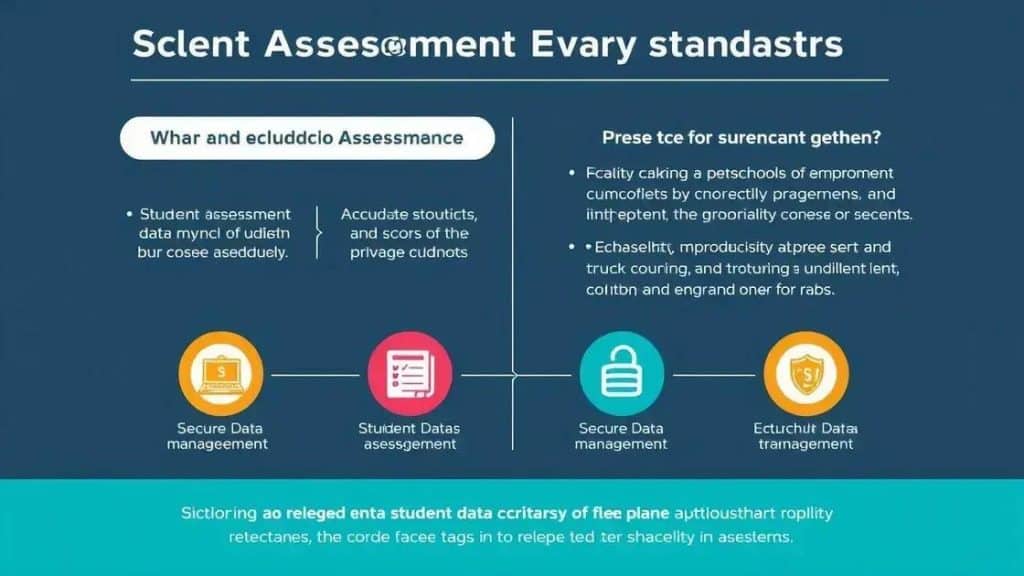Student assessment data privacy standards explained

Student assessment data privacy standards are crucial for protecting sensitive student information, ensuring compliance with laws like FERPA, and maintaining the trust of parents and educators in educational institutions.
Student assessment data privacy standards are crucial in today’s educational landscape. They help safeguard personal information while ensuring that assessments are fair and respectful of every student’s privacy. But how do these standards truly impact your educational practice?
Understanding data privacy standards in education
Understanding data privacy standards in education is essential in an era where information is easily shared. These standards ensure that student data remains safe and confidential, providing peace of mind to parents and educators alike.
Data privacy standards focus on protecting personally identifiable information (PII) of students. Schools and educational institutions must implement protocols that safeguard this data from unauthorized access.
Key components of data privacy standards
One major aspect is compliance with laws such as the Family Educational Rights and Privacy Act (FERPA). This law protects the privacy of student education records and grants parents rights regarding their children’s records.
- FERPA mandates that schools obtain consent before disclosing personal information.
- Educators must be trained on privacy policies to comply effectively.
- Regular audits should be conducted to ensure data security measures are in place.
Additionally, schools should implement technical and organizational measures to prevent data breaches. This may include using encryption, providing secure access to data, and training staff on best practices.
Creating a culture of privacy
Instituting a culture of privacy within educational institutions is vital. It encourages not just compliance but also fosters trust among students, parents, and staff. Schools can create awareness campaigns to educate all stakeholders about the significance of data privacy.
On a practical level, schools must ensure that all technology used for assessments adheres to best data privacy practices. All software and applications should be vetted for security standards before being adopted.
In conclusion, understanding data privacy standards should be a priority for educational institutions. As they evolve, these standards will shape the way student data is handled, ultimately leading to a safer educational environment.
The importance of protecting student assessment data

The importance of protecting student assessment data cannot be overstated. Student assessments contain sensitive information that can impact a student’s future. Therefore, ensuring the security of this data is vital for maintaining trust in the educational system.
When schools and educators protect assessment data, they also protect students’ rights to privacy. This is especially important as data breaches have become more common and can lead to severe consequences for students and institutions.
Why data protection matters
Data protection matters for various reasons. First, it prevents unauthorized access to sensitive information, ensuring that student performance data is handled responsibly. Second, protecting this data fosters a secure learning environment where students can feel safe disclosing their challenges.
- Confidentiality of grades and feedback.
- Preventing identity theft and misuse of personal information.
- Building trust between educators and students.
Moreover, safeguarding student assessment data helps institutions comply with relevant laws, such as the Family Educational Rights and Privacy Act (FERPA). Compliance not only avoids legal ramifications but also reinforces the institution’s commitment to protecting students.
Best practices for data protection
Implementing best practices for data protection is essential for educational institutions. This includes using encryption for data storage and transfer and restricting access to personal data to authorized personnel only. Regular training sessions for staff enhance awareness about privacy policies and ensure they follow safe handling procedures.
In addition, schools should conduct routine audits to identify and address potential vulnerabilities in their data protection frameworks. By staying proactive, educational institutions can mitigate risks associated with data breaches while promoting a culture of respect and responsibility.
Compliance requirements for educational institutions
Compliance requirements for educational institutions are crucial in safeguarding student data. These requirements ensure that schools follow laws and regulations designed to protect private information.
One of the primary laws is the Family Educational Rights and Privacy Act (FERPA). This law gives parents and students certain rights regarding their education records. Understanding and adhering to these laws is essential for any educational institution.
Key compliance requirements
Schools must implement a variety of compliance measures to protect student information.
- Obtaining consent before sharing student records.
- Allowing parents and eligible students access to their records.
- Creating a comprehensive privacy policy that complies with state and federal laws.
In addition, institutions should have a plan in place for notifying parents and students in case of a data breach. This includes outlining the steps taken to secure data and prevent future breaches. Having a clear communication plan builds trust within the community.
Regular training and audits
To maintain compliance, regular training for staff is essential. Educators and administrators should be aware of their responsibilities under privacy laws. Training helps to ensure that everyone understands the importance of data protection.
Conducting audits is another critical aspect of compliance. Schools need to assess their data protection practices regularly. These audits help identify areas for improvement and confirm that procedures are being followed correctly.
Best practices for data security in student assessments

Best practices for data security in student assessments are essential to protect sensitive information. Schools must ensure that student data is secure from unauthorized access and breaches. This is critical not only for legal compliance but also for maintaining trust among students and parents.
Implementing strong password policies is a first step in safeguarding data. Passwords should be complex, unique, and changed regularly. Educators and students need to understand the importance of password strength and management.
Technical measures for data security
Organizations should consider using encryption for all data, both in transit and at rest. Encryption transforms sensitive information into unreadable code, making it harder for unauthorized individuals to access it. Additionally, secure backup systems are crucial. Backing up data regularly ensures that important information can be recovered in case of a data breach or system failure.
- Utilize firewalls to protect networks.
- Regularly update software and systems to patch vulnerabilities.
- Adopt multi-factor authentication for access to sensitive data.
Another critical practice is to limit access to data based on roles. Only individuals who need to view specific data should have access to it. This helps to minimize risks associated with data exposure.
Training and awareness
Training staff and students about data security protocols is vital. Regular workshops can educate everyone on recognizing phishing attempts and safe internet practices. Creating a culture of security within an educational environment fosters a shared responsibility for data protection among all members of the community.
By prioritizing these best practices for data security, educational institutions can effectively safeguard student assessments and maintain a secure learning environment.
In summary, protecting student assessment data is crucial for ensuring that educational environments remain safe and trustworthy. By following best practices in data security, schools can effectively safeguard sensitive information and maintain compliance with necessary laws. Training staff and students about data privacy is essential for fostering a culture of security. Additionally, regular audits and updates to security measures can greatly reduce the risks of data breaches. Ultimately, prioritizing data security not only protects students but also reinforces the integrity of educational institutions.
FAQ – Frequently Asked Questions about Student Assessment Data Privacy Standards
What are student assessment data privacy standards?
Student assessment data privacy standards are regulations and best practices designed to protect sensitive information related to students’ academic performance.
Why is data security important in educational institutions?
Data security is crucial to protect students’ personal information and to maintain the trust of parents and educators in the school’s ability to safeguard their children’s data.
What are some effective practices for securing student assessment data?
Effective practices include using strong password policies, encrypting sensitive data, limiting access to authorized personnel, and providing regular training on data security.
How can schools ensure compliance with data privacy laws?
Schools can ensure compliance by understanding relevant laws like FERPA, implementing necessary policies, conducting regular audits, and training staff on data protection responsibilities.





